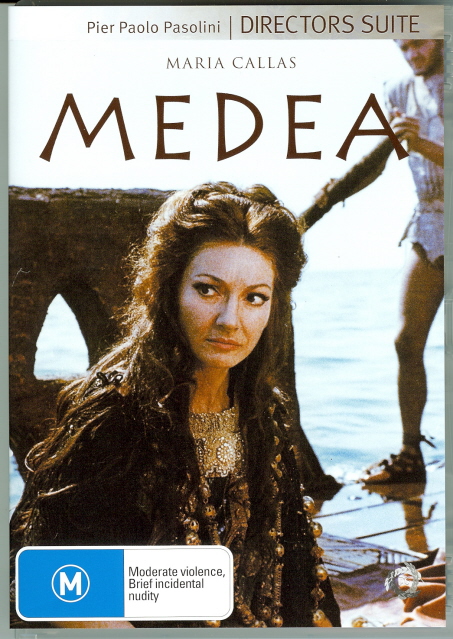Medea (Directors Suite) (1969) |
|
Medea (Directors Suite) (1969) |
|


|
| BUY IT |
| General | Extras | ||
| Category | Drama | Audio Commentary-Gino Moliterno, Head of Film Studies at ANU | |
| Rating |

|
||
| Year Of Production | 1969 | ||
| Running Time | 105:36 (Case: 118) | ||
| RSDL / Flipper | RSDL | Cast & Crew | |
| Start Up | Menu | ||
| Region Coding | 4 | Directed By | Pier Paolo Pasolini |
|
Studio
Distributor |
 Madman Entertainment |
Starring |
Maria Callas Massimo Girotti Laurent Terzieff Giuseppe Gentile Margareth Clémenti Paul Jabara Gerard Weiss Sergio Tramonti Luigi Barbini Gian Paolo Durgar Annamaria Chio Piera Degli Esposti Mirella Pamphili |
| Case | Amaray-Transparent | ||
| RPI | $34.95 | Music | None Given |
| Video | Audio | ||
| Pan & Scan/Full Frame | None |
Italian Dolby Digital 2.0 mono (224Kb/s) English Audio Commentary Dolby Digital 2.0 (224Kb/s) |
|
| Widescreen Aspect Ratio | 1.85:1 | ||
| 16x9 Enhancement |
 |
||
| Video Format | 576i (PAL) | ||
| Original Aspect Ratio | 1.85:1 | Miscellaneous | |
| Jacket Pictures | No | ||
| Subtitles | None | Smoking | No |
| Annoying Product Placement | No | ||
| Action In or After Credits | No | ||
Pier Paolo Pasolini was undoubtedly the most notorious Italian director of the 20th century. Bringing together the sacred and the profane in a manner that shocked and angered audiences he remained true to his Christian-Marxist ideology from his first film to the last.
The first film, Accattone! (1961) was a look at the seamy underworld of a minor pimp and thug. His last, Salo (1975), is still banned in Australia. His violent death in 1975 was so consistent with his highly charged and dramatic existence that some still believe he staged it for dramatic effect!
Medea (1969) dates from the mid-period of Pasolini's obsession with the classics. It is little known and even less seen but today is probably known for one piece of trivia - it contains the only film acting performance from legendary soprano Maria Callas.
Callas had been arguably the dominant figure in opera throughout the middle of the century but her career had finished and by 1969 she was, like Pasolini, less than ten years from death. Using Callas was perhaps no surprise. She was noted for her dramatic performances, playing women dangerous when slighted, and Medea fit perfectly with that model. She had previously sung Cherubini's opera of Medea to great acclaim.
Truth be told, fans of Callas will be the prime audience for the film along with enthusiasts for unusual Italian cinema. Callas nuts should be aware that there is a detailed collection of articles, interviews and analysis of Callas' involvement in the film and the film itself at http://www.cpinternet.com/mbayly/callasasmedea.htm. They should also be aware that although the diva pouts cries and screams she doesn't sing a note.
The story of Medea is as old as Greek civilization itself. In fact, it is part of a number of great stories. In short, Jason is the rightful heir to the throne of Iolcus. When he comes of age he goes to claim his birthright. The usurper tells him that he will willingly hand over the throne if Jason brings him a Golden Fleece from the far off land of Colchis.
Unperturbed by this seemingly impossible task Jason gathers a band of men and sets off in his ship The Argo (hence the Argonauts) in search of the Golden Fleece. He meets Medea, the daughter of the king of Colchis, who falls in love with him and helps him to steal the fleece.
Returning to his homeland Jason makes Medea his mistress and she bears him two sons. Upbeat retellings of the story such as the film Jason and the Argonauts wisely choose to end the story at this point.
Jason and Medea are forced to move to Corinth after some traditional Greek bloodletting. Jason makes a political match to marry the daughter of the king of Corinth, abandoning Medea. She takes horrible revenge in the way that ancient Greek tragic heroines do best.
The Medea of this film is based loosely on the play by Euripides. I say loosely, because the play begins just at the moment of crisis when Medea is about to take her revenge. The film begins with Jason in his youth and the story line contained in the Euripidean play only kicks in two thirds of the way in.
Medea is a film to challenge the viewer. Pasolini combines intense passages of dialogue crammed with legends, plot points and ideas about mythology and meaning. Against this barrage are lengthy sections of silence. Jason barely speaks and Callas spends most of the film expressing emotion through her face and without speaking.
Pasolini doesn't trouble with informing the audience what is going on. In fact, it is part of the charm of the film that it is almost inscrutable at times. The rituals recall an ancient and arcane time that we can only struggle to comprehend.
A fine example is the ritual sacrifice of a young man in the early part of the film. At almost 15 minutes it is a large chunk of the film but it only obliquely features the main characters. Pasolini creates a compelling, even hypnotic, scene that doesn't yield up explanation but it does set the tone for a film where blood and sand are never separated for long.
Anyone looking for comparison between this film and Jason and the Argonauts should steer clear. These Argonauts are pretty much lads out for adventure and pillage. Pasolini has no time for the epic and there are no gleaming breastplates to be found. These are real men on a real mission. He uses the character of a wise centaur to bring home the distinction between mythology and reality - "mythos" and "logos" according to the audio commentary from Gino Moliterno.
With the retelling of the Medea legend he again relies on the power of Callas to express dark emotions and she brings great depth to the role. She is not a woman to be trifled with as she shows in the early part of the film when she dispatches her brother with an axe. She chops him into bits and throws the pieces off the back of the cart in which she and Jason are escaping with the fleece. Why? To buy extra time, for her father and the pursuers must stop out of respect and collect each body part!
It is not possible to describe Medea as "a joy to watch". It is wilfully obscure and difficult to follow. It is largely silent and the print is a shocker. But for the Callas fans it is a must. For the adventurous it is also a film of surprising power and beauty.
Medea was apparently shot at an original aspect ratio of 1.85:1 (although some have referred to it as being shot at European widescreen 1.66:1).
The case for this Madman film refers to the film as having an anamorphic widescreen (16x9 enhanced) transfer. Nope. This is a roughly 1.85:1 letterboxed transfer with some scary rough edges where the frame ends. The initial feeling is one of dismay as the credits writhe in agony against a scratched and dirty background.
The image quality varies throughout but in truth it rarely rises above the average. The level of visual artefacts including scratches, blobs, hairs and other assorted oddments are pronounced.
The print is faded which shows most obviously in exteriors and contrasts present a problem. The close ups represent the best quality in the transfer. That's fortunate as there are a lot of profile shots and close-ups of the diva's anguished face. The image is generally soft.
There are some broken frames at the edits.
There are no problems with compression as the film is spread out on a dual layered DVD. There are no other problems to do with the DVD authoring. The subtitles are bright yellow and readable. They are removable.
I found the film engaging enough to keep me watching but buyers should be aware of the poor quality.
| Sharpness | |
| Shadow Detail | |
| Colour | |
| Grain/Pixelization | |
| Film-To-Video Artefacts | |
| Film Artefacts | |
| Overall |
The sound for Medea is Italian Dolby Digital 2.0 running at 224Kb/s.
The film is dubbed, often badly, and the audio sync wavers wildly at times. Technical perfection was never really a big issue for Pasolini and this film is a pretty good example of that in effect.
There is hiss. There are pops and there are crackles.
The music is very primal. At times it is annoying and difficult to listen to but it perfectly suits the mood of the film. Pasolini uses ancient sounds and instruments throughout to convey the sense of the beauty and barbarism at the heart of the legend.
| Dialogue | |
| Audio Sync | |
| Clicks/Pops/Dropouts | |
| Surround Channel Use | |
| Subwoofer | |
| Overall |
The only extra is an audio commentary by Gino Moliterno, Head of Film Studies at Australian National University. He is an expert on Italian cinema and did the commentary for Madman's release of Umberto D. His commentary is informed and looks at the filmic style of Pasolini but particularly the whole anthropological background to the Medea story. Callas fans may find it a bit light on gossip about their beloved diva but it never strays into arcane film theory.
Definitely worth a listen.
NOTE: To view non-R4 releases, your equipment needs to be multi-zone compatible and usually also NTSC compatible.
Medea has previously been released as a Region 0 DVD.
According to DVDBeaver the extras include the following and comments about the picture quality are very positive.
I would automatically put this forward as the preferable version except that I am unclear whether it is still easily available. Amazon lists it as available for prices between $115.50 (US) and $462.95!
I am not sure why that print could not be used for this release, but if the cost is correct then on that basis this version should be preferred, to all but fanatics.
Medea is a rare film that is lucky to have been released by Madman in Region 4.
It is a pity that the transfer wasn't better both in sound and visual terms but the phrase "beggars can't be choosers" comes to mind.
The only extra is an interesting commentary.
| Video | |
| Audio | |
| Extras | |
| Plot | |
| Overall |
| Review Equipment | |
| DVD | Pioneer BDP-LX70 Blu-ray Player, using HDMI output |
| Display | Pioneer PDP-5000EX. This display device has not been calibrated. This display device is 16x9 capable. This display device has a maximum native resolution of 1080p. |
| Audio Decoder | Built in to amplifier/receiver. Calibrated with Ultimate DVD Platinum. |
| Amplification | Onkyo TX-SR605 |
| Speakers | JBL 5.1 Surround and Subwoofer |